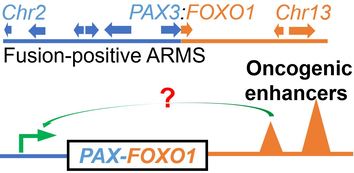The genetic and epigenetic basis of rhabdomyosarcoma development.
Disruption of gene expression program causes diseases, including cancer. Rhabdomyosarcoma (RMS) is a life-threatening pediatric sarcoma, shows imbalanced regulation of proliferation and myogenic differentiation. One of the aggressive subtype, Alveolar RMS (ARMS), is primarily driven by chromosomal translocations between the PAX3 (or PAX7) and FOXO1 loci. Although the genetic lesions resulting in ARMS has been well documented for about 30 years, the targeted therapies for ARMS are still lacking, mainly due to a lack of in-depth understanding of the molecular machinery that drives the ectopic expression of PAX-FOXO1 oncogene. We hypothesize that upon chromosomal translocation, the "fused" cis-regulatory elements activate the promoter of PAX fusion gene, which in turn leads to RMS formation. To test this, we will combine NGS-based epigenome and 3D-genome analysis, high-throughput CRISPR/Cas9-based approaches, as well as new animal models, to identify the "oncogenic enhancers" and uncover the gene regulation network that control PAX-FOXO1 oncogene expression and RMS progression.
Disruption of gene expression program causes diseases, including cancer. Rhabdomyosarcoma (RMS) is a life-threatening pediatric sarcoma, shows imbalanced regulation of proliferation and myogenic differentiation. One of the aggressive subtype, Alveolar RMS (ARMS), is primarily driven by chromosomal translocations between the PAX3 (or PAX7) and FOXO1 loci. Although the genetic lesions resulting in ARMS has been well documented for about 30 years, the targeted therapies for ARMS are still lacking, mainly due to a lack of in-depth understanding of the molecular machinery that drives the ectopic expression of PAX-FOXO1 oncogene. We hypothesize that upon chromosomal translocation, the "fused" cis-regulatory elements activate the promoter of PAX fusion gene, which in turn leads to RMS formation. To test this, we will combine NGS-based epigenome and 3D-genome analysis, high-throughput CRISPR/Cas9-based approaches, as well as new animal models, to identify the "oncogenic enhancers" and uncover the gene regulation network that control PAX-FOXO1 oncogene expression and RMS progression.
